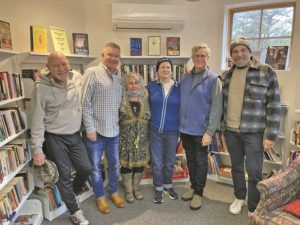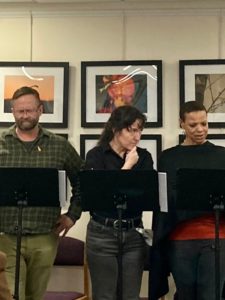TRURO — A group of tender-hearted queers, disparate in their predispositions, shelter in a dune shack to hide from a right-wing militia that prowls the grounds outside. Will they survive? And maybe more pressing: will they survive each other?
These are the questions that ran through audience members’ minds during a reading of Linda Fiorella’s play Beanie’s Last Stand at the Truro Public Library on Saturday, Jan. 21.

As Beanie, the group’s obstinate and perhaps Icarian leader, puts it early in the play: “We’re being hunted — and all you’re worried about is cell service?”
Fiorella’s jocular and frequently prescient play was the most recent entry in the monthly reading series hosted by the Truro Playwright Collective (TPC), a group of seven established playwrights who live on the Outer Cape. Founded and curated by Joseph M. Paprzycki of North Truro, the collective began its inaugural season in October. The readings will run through April.
Along with Paprzycki and Fiorella, the group’s membership — which Paprzycki says is by invitation only — includes Julia Salinger, Fermin Rojas, Will Hildreth, Gary Garrison, and John Dennis Anderson.
Paprzycki started the collective last summer to provide a formal space for playwrights to workshop their pieces in front of live audiences.
“Back in August, I thought about why there’s no place here for writers to get their work on stage,” said Paprzycki. “I got the idea for the group at 3:30 a.m., and the next day I drove over to the Truro library and pitched it to them.”
A board member of the Provincetown Tennessee Williams Festival, Paprzycki has also had his work featured in the Provincetown Theater’s play-reading series and was a participant in the Provincetown Playwrights’ Lab. But after Covid hit in 2020, both the reading series and the Lab have struggled to get back on their feet.
Though Provincetown Theater Artistic Director David Drake announced at a curtain speech in the fall that the reading series would be returning, Paprzycki said, no further announcements have been made. And the Playwrights’ Lab “just sort of fizzled out,” said Salinger, a former Playwrights’ Lab participant. “We couldn’t use the Provincetown Theater space because we didn’t want a whole bunch of us crowded in a room,” she said.

The Lab, which hosted bimonthly meetings open to anyone, included 15 to 20 writers on a regular basis, which Salinger said proved to be unwieldy. “It was large, so it was difficult to have consistency in our readings,” she said. “It became kind of scattered.”
Fiorella, who was also a participant in the Lab, noted that the 10-page cap on the length of plays that participants could workshop was limiting. “It was hard to get feedback if you’re only reading 5 or 10 pages, because people couldn’t understand the whole story,” she said.
Six of the seven members of the playwright collective participated in the Lab, Paprzycki said. That’s how he became familiar with their work. When he began the collective, he already knew who he wanted to invite in.
The seventh member, Gary Garrison, wasn’t part of the Lab. But Garrison has a long list of credits, including serving as executive director of the Dramatist Guild of America from 2007 to 2016. The John F. Kennedy Center’s American College Theater Festival named the Gary Garrison National Ten-Minute Play Award after him because of his contributions to the form.
On one Saturday a month, one of the seven playwrights chooses actors and mounts a reading of a play. “When it’s your play, it’s your Saturday,” Paprzycki said. “You cast, you direct — you do it all.”
Paprzycki said that the performances, which are free, have attracted audiences of 50 to 60 people. (There were more than 90 at last week’s reading, according to the group’s Facebook page.) Getting feedback from the audience is one of the main goals of the group. After the reading, audience discussion follows.
“This whole thing is about letting an audience into the creative process,” Paprzycki said. “Not a lot of people have gone to a reading. They just see the play, but they don’t know how the play got to the stage. The feedback is important because it lets people in on that process. It does a writer a lot of good when you get to hear your work read out loud, and the audience has a new play to go to during these wonderful winter days.”
Fiorella said that, although it can be nerve-wracking, the feedback is the most important part of the process.
“The play isn’t perfect, which is why I’m doing this,” she said. “I want to know what works and what doesn’t work.”
But both Fiorella and Paprzycki say that the feedback doesn’t answer all of a writer’s questions. “If I agree with what you’re saying, fantastic — you just helped me out so much!” Fiorella said. “If I disagree, I ignore you. But I still thank you.”
Paprzycki’s relationship to feedback is more practical: “I have a rule with my own plays that if three people bring the same thing up, then OK, I need to address that.”
For Paprzycki, the effervescence that bubbles up when live art and its audience interact is the best part of the collective. “It’s a great event to have on a Saturday afternoon with our usual 20-to-30-mile-an-hour winds,” he said. “It brings people in.”
The next Truro Playwright Collective reading will be excerpts from Gary Garrison’s 10-minute play anthology Verticals and Horizontals on Saturday, Feb 18 at 2 p.m. See truroplaywrightcollective.org for information.



